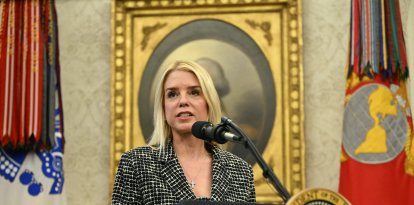Anti-Semites vandalize Columbia University campus on commencement day
The vandals, called by Students for Justice in Palestine, called for a boycott of classes and painted a statue.

Anti-Semitic students protest at Columbia University. April 2024
Life goes on as usual at Columbia University. At the start of the new academic year, not only did classes return, so did the anti-Semitic protests that so agitated the New York campus last year.
With the resumption of classes, several students and professors demonstrated outside Columbia University to continue their Israel-hating proclamations.
The vandals, called by the anti-Semitic organization Students for Justice in Palestine, painted a statue located in front of the Low Memorial Library and demanded that classes be boycotted so that students who want to go to learn and not join the protests will not be able to receive their education.
"As long as Columbia continues to invest and to benefit from Israeli apartheid, the students will continue to resist. Not only protests and encampments, the sky is the limit," Mahmoud Khalil, one of the anti-Semitic students present at the protests, told the Associated Press.
Columbia's interim president calls anti-Semitic incidents "unacceptable."
A few days before the start of the academic year, Columbia University's Task Force on Anti-Semitism released its second report, with which it precised the anti-Semitic incidents that occurred on campus.
"After October 7, many Jewish and Israeli students began to report multiple instances of harassment, verbal abuse and ostracism, and in some cases physical violence. Given the volume of these reports, the Task Force invited all students—not just Jewish and Israeli students—to tell us their stories. Over the course of the spring, nearly five hundred students offered testimonials, at over 20 listening sessions, which provided invaluable insights into the campus climate during these troubled times. These student stories are heartbreaking, and make clear that the University has an obligation to act," detailed the report.
The university's interim president, Katrina Armstrong, described as "unacceptable" all those "painful and distressing incidents of antisemitism" that occurred last academic year.
"I have said it before, and I will say it again: discrimination and harassment, including hate language, calls for violence, and the targeting of any individuals or groups based on their beliefs, ancestry, religion, gender identity, or any other identity or affiliation have no place at Columbia," Armstrong added. "This is an opportunity to acknowledge the harm that has been done and to pledge to make the changes necessary to do better and to rededicate ourselves, as University leaders, as individuals, and as a community, to our core mission of teaching and research."
RECOMMENDATION






















